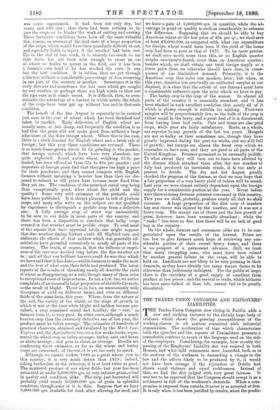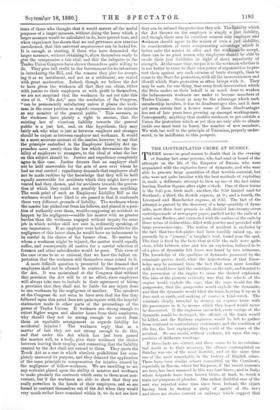THE TRADES UNION CONGRESS AND EMPLOYERS'
THE Trades Union Congress now sitting in Dublin adds a new and striking instance to the already large body of evidence which shows the growing reasonableness of the working-classes in all matters connected with industrial organisation. The moderation of tone which characterises both the speeches and the reports of Committees presents a remarkable contrast to much of the language used on the side of the employers. Considering, for example, how stoutly the passing of the Employers' Liability Act was resisted in both Houses, and what wild statements were hazarded, both as to the motives of the workmen in demanding a change in the law and the effects likely to be produced by it, it would not have been strange if the rejoinders at Dublin bad shown equal violence and equal recklessness. Instead of this, we find the Act judged with very great fairness. It was not to be expected that the Congress should accept it as a settlement in full of the workmen's demands. When a com- promise is imposed from outside, it never is so accepted at first It is only when it has been justified by results, when the predic- lions of those who thought that it would answer all the useful purposes of a larger measure, without doing the harm which a larger measure would be calculated to do, have proved true, and when experience has shown that no real grievance now remains unredreesed, that this universal acquiescence can be looked for. It is enough, at starting, if those who have demanded the larger measure, without obtaining it, show themselves ready to give the compromise a fair trial, and this the delegates to the Trades Union Congress have shown themselves quite willing to do. They give full credit to the Government for its intentions in introducing the Bill, and the reasons they give for accept- ing it as an instalment, and not as a settlement, are stated with great moderation. Indeed, though we believe the Act to have given the workmen all that they can claim, either with justice to their employers or with profit to themselves, we are not surprised that the workmen do not yet take this view of it. "No Act," says the resolution of the Congress, "can be permanently satisfactory unless it places the work- man in the same position as regards compensation for injuries as any member of the general public." This assumes, as the workmen have plainly a right to assume, that the existing law of vicarious liability towards the general public is a just law, and, on this hypothesis, they may - fairly ask why what is just as between employer and stranger should be unjust as between employer and workman. It would be a more accurate account of the matter, however, to say that the principle embodied in the Employers' Liability Act ap- proaches more nearly than the law which determines the lia- bility of employers to strangers, to the ideal of what the law on this subject should be. Justice and expediency completely agree in this case. Justice decrees that an employer shall not be held answerable for the acts of men over whom he had no real control ; expediency demands that employers shall not be made reckless by the knowledge that they will be held equally answerable for accidents which they might have pre- vented had they chosen, and for accidents towards the preven- tion of which they could not possibly have done anything. The weak point of such an Employers' Liability Bill as the workmen would have liked to see passed is that it confounds these very different grounds of liability. The workman whom the master has picked out from his fellows, and placed in a posi- tion of authority over them, would—supposing an accident to happen by his negligence—saddle his master with no greater burden than the workman engaged without inquiry for some job in which neither skill nor care is, ordinarily speaking, of any importance. If an employer were held answerable for the negligence of this latter class, he would have no inducement to be careful in his choice of the former class. No matter by whom a workman might be injured, the master would equally suffer, and consequently all motive for a careful selection of foremen and other suboxdinates would be gone. This view of the case 1133IIIS to us so rational, that -we have the fullest ex- pectation that the workmen will themselves come round to it.
A more difficult question is presented by the demand that employers shall not be allowed to contract themselves out of the Act. It was maintained at the Congress that without this provision the Act will be of no effect, since employers will always take care to include in their agreement of hiring a provision that they shall not be liable for any injury done to one workman by the negligence of another. The speakers at the Congress do not seem to have seen that the line they followed upon this point does not quite square with the hopeful statements made in other parts of the proceedings of the power of Trades Unions. If workmen are strong enough to extort higher wages and shorter hours from their employers, why should they not be strong enough to extort from them an equitable arrangement as regards liability for accidental injuries ? The workmen reply that as a matter of fact they are not strong enough to do this, and that under the Act which has just been passed the masters will, as a body, give their workmen the choice between leaving their employ, and consenting that the liability created by the Act shall not extend to them. They quote the Truck Act as a case in which absolute prohibition has com- pletely answered its purpose, and they demand the application of the same principle to compensation for injuries caused by the negligence of fellow-workmen. We are unwilling to see any-restraint placed upon the ability of masters and workmen to make precisely the contracts which seem to them most con- venient, but if the workmen are able to show that they are really powerless in the hands of their employers, and so are forced to contract themselves out of the Act when they would very much rather have remained within it, we do not see how they can be refused the protection they ask. The liability which the Act throws on the employer is simply a just liability, and though there may be excellent reasons why employer and *orkman should agree to the waiver of even a just liability, in consideration of some compensating advantage which it better suits the master to offer and the workman. to accept, there can be no good reason why employers should be able to evade their just liabilities in right of sheer superiority of strength. At the same time, we put it to the workmen whether it is not better to trust to their own power of organisation to pro- tect them against any such exercise of brute strength, than to come to the State for protection, with all the inconveniences and ill-will which State protection so often brings with it. They may be sure, for one thing, that every fresh intervention which the State makes on their behalf is so much done to weaken the inducements workmen are under to become members of Trades Unions. Great as may be the advantage which such membership involves, it has its disadvantages also, and it does not seem certain that a keener sense of these disadvantages has not of late years been growing up amongst working-men. Consequently, anything that enables workmen to get outside Union the protection which as yet they are only able to obtain inside one must tend to lessen the number of new membere. We wish too well to the principle of Unionism, properly under- stood, to be indifferent to this prospect.



































 Previous page
Previous page